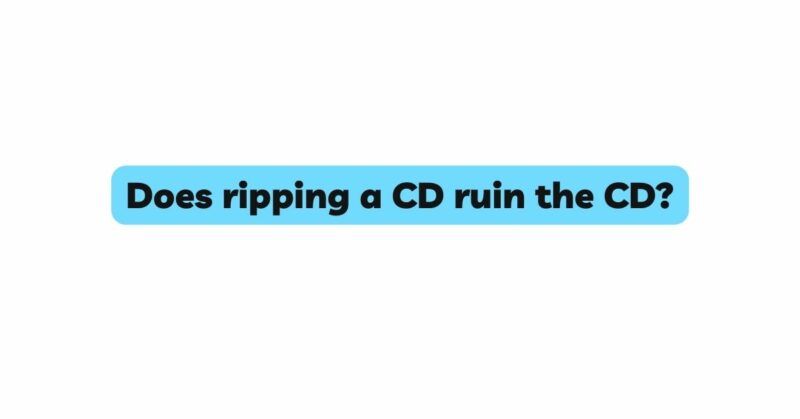In the realm of modern music consumption, the act of ripping CDs has become a common practice. However, lurking behind this practice is a persistent question: Does ripping a CD ruin it? This article aims to dispel the misconceptions surrounding CD ripping, unraveling the technicalities behind the process, addressing concerns about potential damage, and shedding light on how CD ripping can actually extend the life of your beloved music collection.
Understanding CD Ripping: Before delving into the impact of CD ripping on the physical disc, it’s crucial to understand what CD ripping entails. CD ripping involves extracting the audio data stored on a compact disc and converting it into a digital format, such as MP3 or FLAC. This process utilizes specialized software to read the binary data encoded on the disc’s surface, translating it into a digital audio file. The primary goal is to create a duplicate of the original audio content for convenient digital playback.
The Mechanics of CD Ripping: Contrary to the misconception that CD ripping damages the disc, the process is non-destructive. Ripping software uses laser technology to read the microscopic pits and lands on the disc, interpreting them as binary data. This data represents the audio waveform of the track. The software then encodes this data into a digital format that can be played on various digital devices.
Preservation, Not Ruin: The notion that ripping a CD ruins it stems from early misconceptions about the process. In reality, CD ripping is a preservation technique. The original CD remains physically intact, and no content is erased or altered during the ripping process. The aim is to create a digital backup that can be enjoyed on different platforms, safeguarding the original CD against wear and damage.
No Physical Alteration: A critical aspect to understand is that CD ripping does not physically alter the disc. The disc’s surface, the pits, and lands that contain the binary data remain unchanged. The laser used in the ripping process does not interact with the physical structure of the disc beyond reading its content. Thus, the act of ripping itself does not introduce any wear or harm to the CD.
Data vs. Physical Copy: CD ripping is akin to making a copy of a document. Just as photocopying a document doesn’t harm the original, ripping a CD doesn’t harm the original disc. The data on the disc is duplicated, while the physical disc itself remains untouched. This separation between data and physicality is a fundamental aspect of CD ripping.
Benefits of CD Ripping:
- Digital Access and Portability: Ripping a CD extends its usability beyond traditional CD players. Digital audio files can be stored on various devices, making your music collection portable and accessible.
- Organizational Convenience: Ripped audio files allow for easy organization and management. Music management software enables the creation of playlists, sorting tracks, and adding metadata.
- Preservation of Quality: Ripping can preserve audio quality. Formats like FLAC offer lossless compression, ensuring that the digital file closely mirrors the original CD’s sound.
- Backup and Future-Proofing: CD ripping creates digital backups, safeguarding against physical disc degradation. It also future-proofs your collection as technology evolves.
Common Misconceptions: The misunderstanding that CD ripping ruins discs is part of a broader set of myths surrounding digital technology. Early misperceptions and lack of information contributed to the spread of these misconceptions. As technology advanced, it became clear that CD ripping is a beneficial practice that poses no threat to the original discs.
Preservation Ethos: CD ripping aligns with the ethos of preservation. Physical CDs are susceptible to wear, scratches, and damage over time. Ripping a CD allows for the creation of digital backups, ensuring that the audio content remains accessible and unmarred by the passage of time.
Legal and Ethical Considerations: While ripping a CD for personal use is generally legal in many jurisdictions, the legality can change if the digital copies are shared or distributed without authorization. Ethical considerations involve respecting the rights of artists and copyright holders when sharing ripped content.
Conclusion: Enriching Musical Experiences: In the realm of CD ripping, the misconception that the process ruins discs has been firmly debunked. CD ripping is a transformative practice that breathes new life into physical collections, extending their usability, accessibility, and preservation. By understanding the mechanics of the process and its preservation-oriented goals, music enthusiasts can confidently embrace CD ripping as a way to enrich their musical experiences without compromising the physical integrity of their cherished collections.


